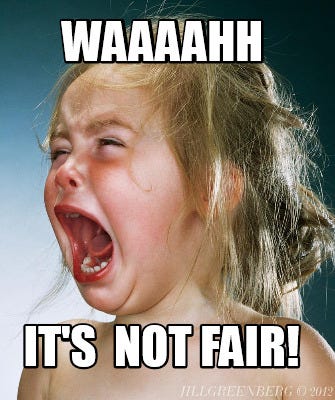Of all the ideas that seem most solid and valuable and straightforward when it comes to should and shouldn’t questions about how we interact, unfairness seems beyond controversy. It’s hard to imagine someone with a straight face arguing that it’s just fine if things are unfair.
Yet, I dare you to imagine a situation where someone complains, “It’s not fair!” when the complaint has nothing to do with missing out on something they want or getting something they didn’t want (like a spanking or a fine.) Can you? So, what’s primary: the unfairness, or the fact that they wanted and didn’t get or didn’t want but got anyway?
In contrast, imagine a situation where you have everything you need, everything you want, while safe and comfortable. How important an issue would unfairness be then?
What if the fact itself that you have everything you need, everything you want, while safe and comfortable turns out to be unfair according to someone else? And would they complain that your situation is unfair to them if they had everything they needed, everything they wanted, while safe and comfortable themself?
This is just one of the many take-for-granted mainstays of common sense and conventional wisdom that, upon careful scrutiny, turns out to be meaningless outside the context of a codependent mentality. Unfairness is very, very important to children, but the only kind of adults that unfairness matters to are those that find themselves in some sort of distress which they feel at a loss to resolve—whether their distress focuses on themselves (typically) or, empathetically, on someone they care about.
When someone’s unfair to us and we’re competent and confident, we take action to deal with it. It’s when we’re neither competent or confident that we cry foul and look for an umpire.
Am I saying that unfairness is a “wrong” or “bad” or dumb or silly or unimportant issue? No. I’m actually saying nothing at all about unfairness itself. I’m saying that we don’t care about it when we’re not distressed.
When we’re safe and happy, we can look at unfairness and not be bothered by it much—unless the prospect of doing nothing about it causes us social distress—for example, the likelihood that people will treat us like a “sucker” for letting someone take advantage of us without repercussion. It makes no sense to burn thousands in court over a couple hundred—but if you’ve already got millions, it might well not make sense to waste mere hundreds in court over thousands, either
The stress and time it takes to correct unfairness involves an entirely different kind of cost-benefit ratio than just the money alone. Con artists (including corporations and politicians) are well aware of this. The justice system was set up precisely to leverage this disparity in favor of anyone and everyone of means that wants to take advantage of the poor and those of meager means.
Unfairness becomes an issue or a non-issue without regard to what’s objectively going on, but instead because of how we feel about what’s going on.
This is one of the insights that led me to realize that rich people are mentally ill. It’s not just that the unfairness of their obscene hoarding on all fronts makes little to no difference to them, even in spite of the suffering it causes. Far more, it’s because they, of all people in the world, have opportunity coming out their ears to not give even a bitty-shit about unfairness; but no matter how much they amass, they’re no less driven to incessantly seize more and more of the very things that, with just a smidgen of their troves, would make normal people pretty much immune to concerns about unfairness.
That’s some fucking wacko obsession, there.






"...their obscene hoarding on all fronts makes little to no difference to them..."
"...no matter how much they amass, they’re no less driven to incessantly seize more and more..."
It's even worse than that. It does make a difference to them. They seem to enjoy and take pride in the unfairness and making other people suffer. They even go so far as to anoint themselves with a self-righteous superiority over the weak and helpless victims of their unfairness. Wacko, evil indeed.